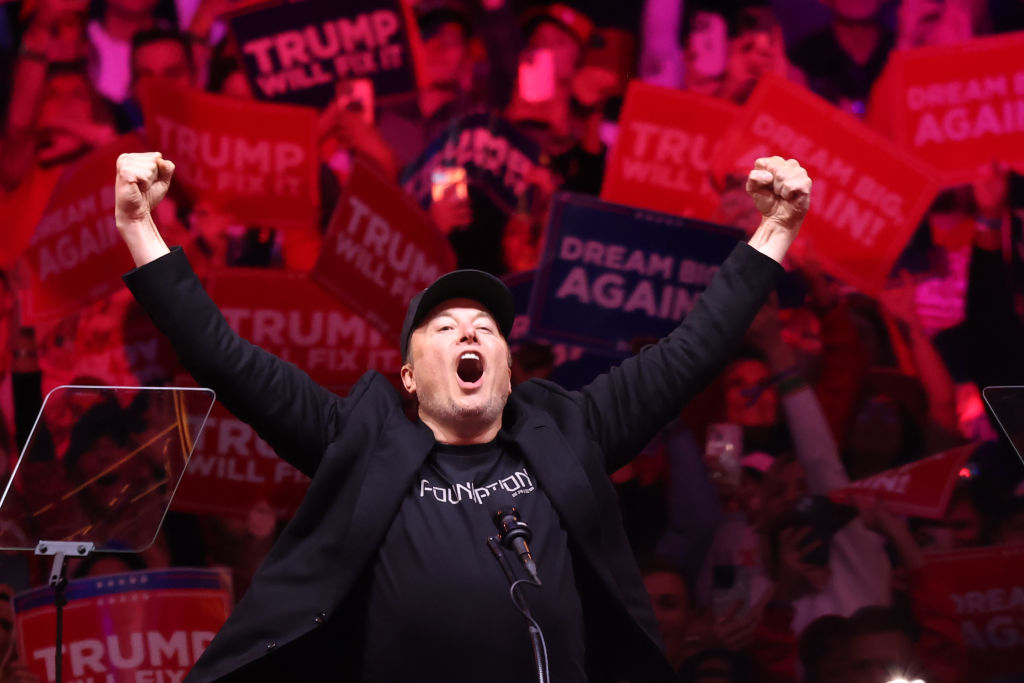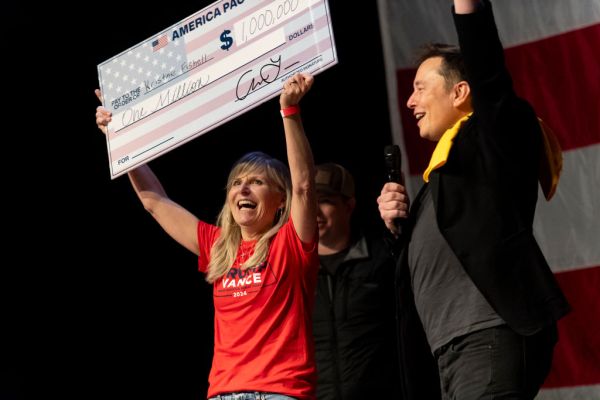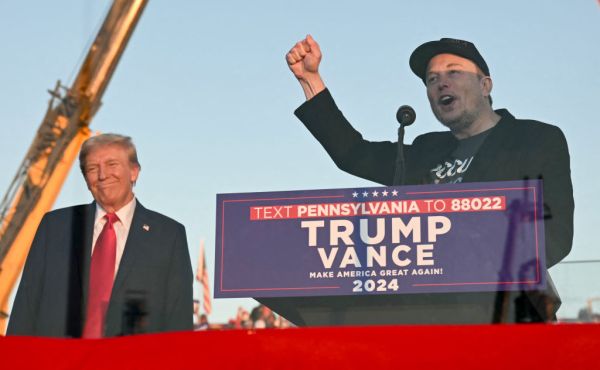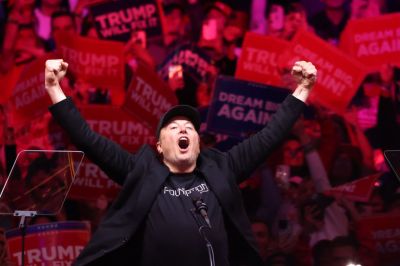Happy Tuesday! Don’t look now, but there’s just one week until Election Day. No matter how it ends, we can take heart in this: We’ll finally be able to watch a football game again without wading through endless and repetitive political ads.
Quick Hits: Today’s Top Stories
- In an op-ed on Monday, Washington Post owner Jeff Bezos defended his paper’s decision not to endorse a candidate for president, saying there is “no quid pro quo of any kind at work” and that he was not aware of the meeting between the chief executives of one of his companies and former President Donald Trump which took place on the day the paper announced it would not endorse either candidate. Bezos also defended his own record as owner of the Post: “I challenge you to find one instance in those 11 years where I have prevailed upon anyone at The Post in favor of my own interests. It hasn’t happened.” NPR reported Monday that some 200,000 people—roughly 8 percent of the paid subscribers—had canceled their subscription to the paper since publisher Will Lewis announced on Friday the paper’s decision not to endorse a candidate.
- Philadelphia District Attorney Larry Krasner on Monday sued billionaire Elon Musk over his political action committee’s sponsorship of a $1 million sweepstakes for registered swing state voters who signed a petition calling for free speech and the right to bear arms. The lawsuit alleges that the lottery is illegal because it is not being administered by the state, as Pennsylvania consumer protection laws require. The Department of Justice also warned last week that the sweepstakes could also violate federal laws that bar paying individuals to register to vote.
- Both presidential campaigns continued their swing state blitz on Monday, with Vice President Kamala Harris campaigning in Michigan and former President Donald Trump traveling to Georgia. Trump met with religious leaders early in the day, before holding a rally at Georgia Tech in downtown Atlanta in the evening. In Michigan, Harris visited a semiconductor manufacturer and a union training facility, and held a rally in Ann Arbor with vice presidential candidate Tim Walz and singer Maggie Rogers.
- The Trump campaign sought to distance itself from racially provocative remarks made by comedian Tony Hinchcliffe at the former president’s Sunday rally in Madison Square Garden in New York City. Danielle Alvarez, a senior adviser for the Trump campaign, wrote that a racially charged joke about Puerto Rico “does not reflect the views of Donald Trump or the campaign.” Vice President Kamala Harris on Monday released an ad referencing the racist statement, saying “Puerto Ricans deserve better.”
- Axios reported on Sunday that Treasury Secretary Janet Yellen—joined by several of her international counterparts—last week warned Israeli Prime Minister Benjamin Netanyahu in a letter that the West Bank’s economy faces a looming threat of collapse, should it be cut off from Israel’s financial system. Yellen and the other finance ministers urged Netanyahu to “take steps to decrease” that risk; if Israeli Finance Minister Bezalel Smotrich does not sign off by October 31 on a periodic waiver that allows Israeli and Palestinian banks to correspond, millions of dollars in international support may not be available for disbursement. Smotrich, leader of the ultranationalist Religious Zionism party, has sought to weaken the Palestinian Authority in the past and accuses Palestinian banks of allowing funding for terrorism.
- Iranian Foreign Ministry spokesman Esmaeil Baghaei said on Monday that Iran “will use all available tools to deliver a definite and effective response to the Zionist regime,” the first statement definitively threatening a response to Israel’s weekend strikes on Iran. The Israeli Cabinet on Monday moved its regular meeting to a secret location, in light of Iranian declarations.
- Thousands of Georgians rallied in the capital of Tbilisi Monday night in protest of alleged corruption in the electoral victory on Saturday of the ruling pro-Russian party, Georgian Dream. Georgia’s pro-Western president, Salome Zourabichvili, called for the protest of an election that she described as “totally falsified.” Thirteen European foreign ministers said Monday that the alleged “violations of electoral integrity are incompatible with the standards expected from a candidate to the European Union,” and both NATO and the U.S. have called for a full investigation into any election violations.
- The Defense Department on Monday warned that around 10,000 North Korean soldiers were moving toward the battlefield in Russia’s Kursk region, where Ukrainian forces have held territory since August. The Pentagon also said Monday that no new limits would be imposed on Ukranian use of American arms if North Koreans became actively involved in hostilities, though the West has maintained restrictions on how deep Ukraine may strike into Russia with Western-provided long-range weapons.
- The Israel Defense Forces (IDF) on Monday claimed that its raid over the weekend on the Kamal Adwan Hospital in northern Gaza captured around 100 Hamas militants. Video released by the IDF purports to show a Hamas suspect claiming that the terrorist group was using hospital ambulances to move its operatives around. World Health Organization chief Tedros Adhanom Ghebreyesus said on Saturday that only two doctors were left to care for the hospital’s roughly 200 patients after the operation.
- Federal authorities are investigating fires on Monday that destroyed two ballot drop boxes—one in Vancouver, Washington, and another in Portland, Oregon. Police believe the incidents—which potentially destroyed hundreds of ballots in Vancouver but only a few in Portland—are connected. Authorities discovered what they referred to as “incendiary devices” and a “suspicious vehicle” linking the attacks.
Dark MAGA

“I’m not just MAGA,” Elon Musk declared from the stage at the vaunted Madison Square Garden in New York City on Sunday night. “I’m dark, gothic MAGA.” He gestured at his bespoke Trump campaign hat that was, indeed, dark—with the promise to “Make America Great Again” scrawled in lettering that may as well have said “Make Transylvania Great Again.”
It was a twist on a line Musk has repeated during a flurry of recent campaign trail appearances in a series of multicolored MAGA hats. On the stump, Musk—the richest man in the world and perhaps former President Donald Trump’s highest-profile booster—often seems more full of enthusiasm for the former president than Trump himself: He bounds around the stage jumping, gesticulating wildly, and vocalizing strangely.
But it’s been a winding journey to get here for the multi-billionaire tech entrepreneur whose path through the 2024 election cycle began by launching Florida Gov. Ron DeSantis’ campaign in May 2023. Now, with just a week until Election Day, Musk is undeniably aboard the Trump train—and he’s shoveling in heaps of coal in the form of cold, hard cash and in-kind conspiracy theories on his social media platform and on the trail.
Musk—who was born in South Africa but apparently obtained U.S. citizenship sometime in the early 2000s, reportedly after a period of questionable immigration status—has for most of his career been circumspect in his political donations and involvements. He gave money to both Republicans and Democrats through several election cycles: In 2004, he reportedly donated $2,000 apiece to both then-President George W. Bush and Democratic challenger John Kerry.
To the extent he did make pronouncements about politics, Musk was an early, if cautious, Trump skeptic. “I don’t really have strong feelings, except that I—hopefully Trump doesn’t get the nomination of, you know, the Republican Party,” he said at an October 2015 event for Vanity Fair with Sam Altman (with whom he would jointly found OpenAI—the company ultimately behind ChatGPT—later that year). “Because I think, that’s, um, yeah—that wouldn’t be good.”
“At most he would get the Republican nomination,” Musk continued, clearly weighing his words carefully. “But I think that would still be a bit embarrassing.” Musk, who at that point owned both the electric car company Tesla and space exploration company SpaceX, added that he gets involved in politics “as little as possible.”
After Trump won the presidency in 2016, Musk accepted positions on two of the then-president-elect’s business advisory councils, but withdrew from both in June 2017 after Trump—by this time president—removed the U.S. from the Paris climate agreement. “Climate change is real,” Musk tweeted. “Leaving Paris is not good for America or the world.”
Musk has said publicly that he voted for then-Vice President Joe Biden in 2020. Tesla faced investigations from various federal agencies throughout Biden’s tenure, but his break with Biden, Democrats, and his own, more measured political speech seems to be at least partially traceable to a 2021 snub: Musk was not invited to a White House event celebrating electric vehicles—a third of which on the road at that point were Teslas—apparently over concerns that doing so would anger the United Auto Workers union. Unlike other U.S. car producers, Musk’s factories do not employ a unionized workforce.
The relationship between Musk and Democrats of all stripes seemed only to deteriorate from there. In mid-2022, Musk boasted of having voted for a Republican for the first time in a Texas special election and said he was bullish on DeSantis’ likely Republican candidacy even as he hoped Trump would “sail into the sunset” rather than run for president again. Trump hit back, saying that as president, he could have told Musk to “drop to your knees and beg,” and that Musk would have done it.
Musk was well and truly done playing coy about his politics by May 2023, when he helped launch DeSantis’ presidential bid in a barely functional Twitter Spaces discussion. Just a few months earlier, Musk had bought Twitter after a messy legal back-and-forth during which several times he seemed to change his mind about buying the social media platform. His motives for the purchase were a little unclear: It was all at once apparently an altruistic move to preserve what he considered the world’s “de facto town square,” a chance to create an “everything” app, and an opportunity to achieve what appears to be the lifelong goal of naming a company “X.”
The Tesla CEO co-hosted the DeSantis event with fellow Silicon Valley Tech Bro and PayPal alum David Sacks. But Musk and Sacks, both early fans of the governor, didn’t seem to have any problem becoming Trump endorsers once it was clear he would win the nomination. In February of this year, Musk reportedly made the case for Trump at a dinner with skeptical GOP donors, expressing deep concern over illegal immigration despite sharing reservations about the man himself.
Sacks—along with tech mogul Peter Thiel—was among those Silicon Valley reactionaries to successfully shepherd Sen. J.D. Vance of Ohio to the front of the vice presidential contender pack. Both Vance—who for years benefited from Thiel’s financial support—and Musk have long been a part of the Silicon Valley venture capital world that has now encircled the former president.
So Musk’s July 13 endorsement of the former president—which came just after an attempted assassination of Trump—was perhaps unsurprising, even if it would have been difficult to predict the zealous fervor with which the man who was once so ambivalent about politics has taken to the campaign trail.
Musk set up a political action committee—the America PAC—to benefit Trump even before he’d officially endorsed him as the two developed a private rapport, gathering cash mostly from Silicon Valley. In the months since, he’s reportedly pledged $45 million a month of his own money to the PAC—he is worth somewhere in the neighborhood of $200 billion, which does help put the eye-watering outlay in perspective.
The PAC has focused mostly on voter mobilization in swing states, though it’s potentially gone too far. In one initiative, the PAC has been handing out $1 million to a randomly selected registered voter—in specific states—who signed a petition in support of the First and Second Amendments.
The Department of Justice reportedly sent a letter last week to Musk’s PAC warning that the sweepstakes may not pass the sniff test: It’s illegal to pay people to register to vote. But as Sarah and David pointed out on Advisory Opinions, it would not be a slam-dunk case to argue it violated the law, since voters are technically being induced to sign the petition, not to register to vote directly.
On Monday, the Philadelphia district attorney sued Musk and his PAC, alleging that the giveaway violates state law, which requires lotteries to be operated by the state. Last Sunday, the second day of the giveaway, the PAC framed the money as payment for the job of “spokesperson.”
Musk has been a constant presence on the campaign trail with the former president, doing what has bizarrely become his trademark starfish jump. “He saved free speech, he created so many different great things,” Trump said of Musk earlier this month in his return rally in Butler, Pennsylvania—where he was shot in July. It was Musk who unbanned the former president from Twitter when he took over the company two years ago.
In speeches at rallies and solo town halls, Musk seems obsessed—as Trump is—by illegal immigration and voter fraud, frequently returning to the conspiracy theory that Democrats are allowing illegal immigration to go unfettered to help their electoral chances. “I also see really a deliberate attempt to import as many people as possible into swing states like Pennsylvania in order to ensure that there is a permanent one state—that America becomes a permanent one-party state,” he said at a town hall event outside Philadelphia earlier this month, responding to a question about what made him interested in politics now. “Then you put them on the fast track to citizenship, this is without considering any cheating. This is legalizing. If that happens over the next four years, there will be no swing states. They’re importing voters—I think that’s obvious to anyone who looks and we will have a situation like we have in California where it’s a one-party state.”
“Make the margin of victory so big that ‘you know what’ can’t happen,” he said Sunday night before the crowd at Madison Square Garden, coyly avoiding saying “fraud.”
But it’s not just on the campaign trail where he’s boosting nonsense: On X, Musk has become a prolific conspiracist. A Bloomberg analysis of all of Musk’s posts on X in the last year showed that he posts about immigration and fraud more than any other topics, and that those posts are engaged with by more people than any other subjects. By the numbers, his musings on immigration and fraud have attracted more than 10 billion views.
“Massive numbers flown directly to swing states and put on the fast track to citizenship,” he tweeted on October 25. “Voter importation. It’s a sure way for the Democratic Party to achieve permanent victory. Diabolically smart.”
But Musk—with his more than 200 million followers—is not picky about which conspiracy theories he boosts. In the immediate aftermath of Hurricane Helene, Musk was actively promoting false information about the Federal Emergency Management Agency—which prompted an online exchange and a phone call with Transportation Secretary Pete Buttigieg. He also amplified bogus claims about Haitian immigrants in Springfield, Ohio. Before the debate between Trump and Vice President Kamala Harris in September, he shared a typo-filled “affidavit” from a “whistleblower” claiming ABC News shared questions with Harris.
If Trump wins next week, Musk seems poised to be on the inside of a second Trump administration—formally or informally. Trump has proposed Musk as the “Secretary of Cost-Cutting,” and on Sunday Musk said he could easily cut $2 trillion from the federal budget, without providing details.
But even if he’s only informally connected to the administration, the relationship could be complicated. The Wall Street Journal reported last week that Musk has been in consistent contact with Russian President Vladimir Putin over the last two years, even reportedly fielding a request from the Russian leader not to activate his Starlink satellite internet service over Taiwan as a favor to Chinese President Xi Jinping. The claim prompted NASA Administrator Bill Nelson to call for an investigation, since Musk’s SpaceX is a major contractor with the U.S. government, including for services to ferry American astronauts back and forth to the International Space Station.
And if Harris wins on Tuesday? “If he loses,” Musk told Tucker Carlson earlier this month, “I’m f—ed.”
Worth Your Time
- Whose idea was it to present Latter-day Saint voters with beer koozies and coffee mugs? The Atlantic’s McKay Coppins chronicled the “thunderously incompetent” rollout of the “Latter-Day Saints for Trump” campaign, and how it might actually have electoral consequences: “There’s little doubt that most LDS voters will support Trump this year,” he wrote. “Conservative attitudes on abortion and other cultural issues guarantee a certain degree of partisan loyalty. But younger Latter-day Saints, who came of age in the Trump era, are significantly less conservative than previous generations. And in the past eight years, some anti-Trump Mormons have gotten more comfortable voting for Democrats instead of third-party protest candidates. … For the Harris campaign, holding on to those voters this year could be the difference between losing Arizona and cracking open a celebratory beverage on Election Night. I know a website where they might be able to get some koozies on sale.”
- Misinformation and disinformation are a problem—but government may not be the solution, Angel Eduardo and Adam Goldstein argued in Quillette. “Ultimately, the core problem with all legislative misinformation bills is that they inevitably position the government as the arbiter of truth,” the pair wrote. “And, as anyone who has heard of George Orwell should know, that’s a terrible proposition—not only because the truth is often elusive, but because government officials have strong incentives to purge public discourse of opinions and narratives that challenge their hold on power. There is no doubt that misinformation is a problem. The inability to agree upon what is and isn’t true clearly hinders our capacity for progress. … But laws are blunt tools and liable to do more harm than good here. Our governments are made up of human beings, susceptible to error. Granting them the power to determine and enforce the truth robs us not just of our agency and right to free expression, but also our responsibility as individuals living in the twenty-first century.”
Presented Without Comment
Semafor: Bodyguards Inadvertently Expose French President Macron’s Location on Strava
In the Zeitgeist
Just a few weeks after librarians in Leipzig, Germany, announced they’d discovered a new piece by Mozart, another previously unknown work of the classical canon was found in the flotsam and jetsam of a dusty archive: a waltz thought to be the work of famed composer Frédéric Chopin.
This is a public service announcement to museum curators, librarians, and owners of large quantities of paper, wherever they may be: Do an inventory, we beg of you, lest there’s an early draft of the Magna Carta out there gathering dust under your old loan application.
Toeing the Company Line
- In the newsletters: Dispatch Politics covered the push for a positive closing message for Kamala Harris and Nick opined (🔒) on weak men, Jeff Bezos among them.
- On the podcasts: Sarah and David explored how the election could shape the federal courts on Advisory Opinions.
- On the site: Charlotte unpacks Israel’s weekend attack on Iran, our symposium series on potential policies of Donald Trump and Kamala Harris concludes with an entry on the rule of law, and Chris Stirewalt makes his best case for why Trump is sure to win next week—and then his best case for why Harris is sure to win.
Let Us Know
How do you account for Musk’s transformation over the last 10 years?







Please note that we at The Dispatch hold ourselves, our work, and our commenters to a higher standard than other places on the internet. We welcome comments that foster genuine debate or discussion—including comments critical of us or our work—but responses that include ad hominem attacks on fellow Dispatch members or are intended to stoke fear and anger may be moderated.
With your membership, you only have the ability to comment on The Morning Dispatch articles. Consider upgrading to join the conversation everywhere.